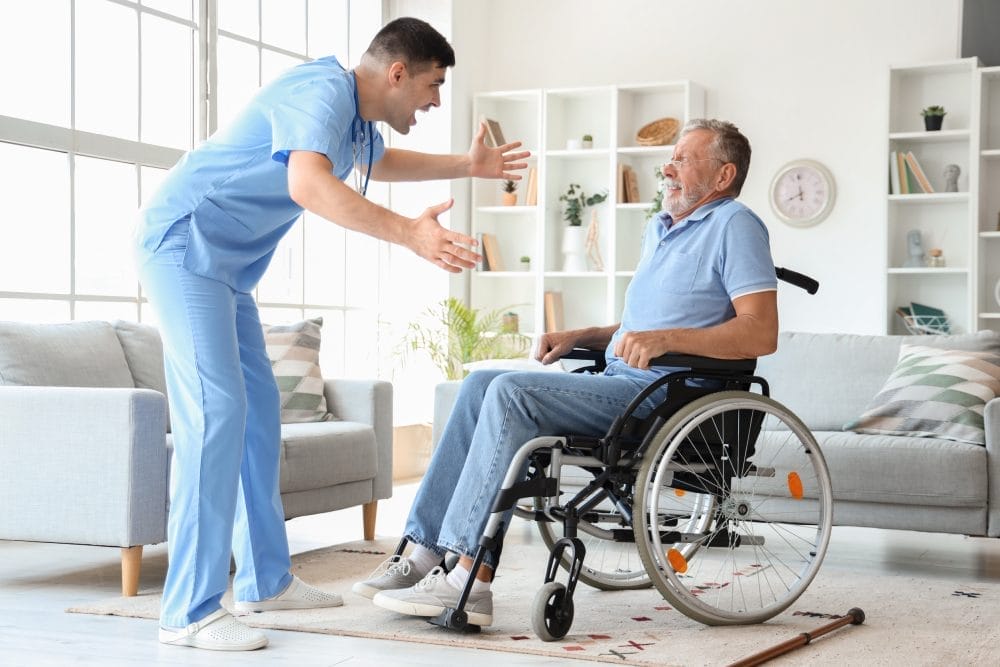The elderly deserve compassion, dignity, and safety—yet far too often, elder care facilities and systems fall short of these ideals. Behind the pleasant brochures and polished visiting rooms, some nursing homes and assisted living facilities quietly permit practices that would spark outrage—and criminal charges—if they happened elsewhere. What is tolerated behind closed doors can feel shockingly out of step with basic human decency.
When society allows such conditions to persist, it raises uncomfortable questions about how it values its oldest members.
1. Restricting Freedom of Movement
In many elder care homes, residents are regularly confined to their rooms or locked inside facilities without meaningful consent. Outside of prisons, forcibly restricting someone’s freedom of movement would be considered kidnapping or unlawful detention. Families are often told this is for safety reasons, yet residents can feel like inmates instead of patients. This kind of confinement strips people of autonomy and purpose, which can speed cognitive decline. Despite this, it remains a routine policy in countless care homes.
2. Overmedicating to Keep Residents Docile
Chemical restraints are a grim reality in many elder care settings. Residents are often given powerful sedatives or antipsychotics not for medical conditions, but simply to keep them quiet and manageable. Administering drugs without true medical need would be assault in any other circumstance. The practice robs elders of clarity, awareness, and dignity, all for the convenience of understaffed facilities. In most places, this passes as normal rather than the abuse it truly is.
3. Ignoring Reports of Abuse
When an elderly resident speaks up about mistreatment, their complaints are often dismissed as confusion or dementia. In other parts of society, failing to investigate credible reports of assault or neglect would be grounds for prosecution. Yet, countless seniors find their voices silenced under the assumption that they are unreliable narrators of their own suffering. This systemic disbelief emboldens abusers and isolates victims. It is a betrayal that would be scandalous in any other care context.
4. Using Restraints for Staff Convenience
Physical restraints are still used in many nursing homes, despite modern guidelines advising otherwise. Tying someone to a bed or chair against their will is physical assault in nearly every other environment. The justification is often framed as preventing falls or self-harm, but many times it is simply about reducing workload. The result is physical and psychological damage that strips away basic freedom. This quiet cruelty continues with little oversight or accountability.
5. Underfeeding and Dehydration
Malnutrition and dehydration plague elder care residents more than the public realizes. With understaffed kitchens and rushed schedules, some seniors are left hungry or thirsty for long stretches. If a child were consistently underfed, it would trigger a child abuse investigation in an instant. Yet older adults experiencing the same neglect often slip through the cracks. Poor nutrition directly contributes to declining health and early death, yet remains a widespread failure.
6. Charging Exorbitant Fees for Basic Needs
Many families are shocked to discover how easily elder care homes inflate charges for essentials. Diapers, extra meals, help with dressing—services that are basic human care are billed at outrageous markups. In any other business, these surprise charges would be labeled predatory or even extortion. Residents and their families are often powerless to negotiate, trapped by the lack of alternatives. Exploiting vulnerability for profit rarely looks this brazen in other settings.
7. Neglecting Medical Care
Basic medical care, from wound treatment to hygiene, is neglected in some elder care environments. Bedsores, untreated infections, and avoidable hospitalizations are clear signs of neglect. Denying someone necessary medical attention can amount to criminal negligence in other contexts. Yet elder care facilities often hide behind complex regulations and overwhelmed staff. The result is preventable suffering that would be scandalous anywhere else.
8. Isolating Residents from Loved Ones
Cutting off contact with family or friends is another tactic quietly normalized in elder care. Sometimes it is done for infection control, other times for staff convenience, or even to hide mistreatment. In any other scenario, isolating a vulnerable adult from loved ones would be emotional abuse or coercion. The damage of loneliness and forced separation cannot be overstated for older adults. Despite this, families are often powerless to fight isolation policies.
9. Retaliating Against Whistleblowers
Staff who try to speak up about mistreatment or unsafe conditions often face retaliation or dismissal. Retaliating against whistleblowers is illegal in most workplaces, yet many elder care staff are silenced through threats or blacklisting. This culture of fear shields bad actors and discourages accountability. Without brave staff advocating for residents, neglect and abuse flourish in secrecy. Other industries would never tolerate this systemic silencing.
10. Failing to Report Deaths Accurately
Deaths in elder care settings are sometimes underreported or misclassified to avoid scrutiny. If a death occurs due to neglect or abuse, failing to disclose it honestly would be criminal in hospitals or public institutions. Yet poor oversight and weak regulation allow questionable deaths to go unnoticed. Families left in the dark have little recourse and often never learn the truth. This lack of transparency hides systemic failures from public view.
Protect The Seniors In Your Life
Too often, what passes as normal practice in elder care would be unimaginable—and criminal—if it happened to anyone else. As society ages, the moral obligation to protect the elderly from indignity and harm must be stronger than the convenience of ignoring what happens behind locked doors.
Change begins with awareness and collective outrage that demands better standards and oversight. Everyone deserves to live their final years with the same respect they enjoyed in youth. Share your thoughts below—what elder care practices do you think should never be tolerated?
Read More
Why More Seniors Are Choosing Not to Leave Inheritances
Here’s Where The Rich Take Their Family Members Instead of Nursing Homes








